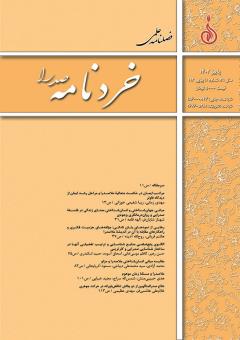مقایسه مبانی انسان¬شناختی ملاصدرا و مزلو
محورهای موضوعی : ملاصدراپژوهی و اندیشۀ حکمت متعالیهمحمد آزادی 1 , سيد محمدعلي ديباجي 2 , مسعود آذربایجانی 3
1 - دانشجوی دکتری فلسفه و کلام، دانشگاه تهران، پردیس فارابی، قم، ایران
2 - دانشیار دانشکده الهیات، دانشگاه تهران، پردیس فارابی، قم، ایران
3 - استاد پژوهشگاه حوزه و دانشگاه، قم، ایران
کلید واژه: انسان, انسان¬شناسی, انسان¬گرایی, کمال¬گرایی, حکمت متعالیه, ملاصدرا, مزلو,
چکیده مقاله :
مزلو، در مقام یک روانشناس انسانگرا و ملاصدرا، در مقام یکی از بزرگترین اندیشمندان سنت اسلامی، دیدگاههای متفاوتی دربارۀ چیستی انسان بیان کردهاند. با توجه به اینکه هر دو اندیشمند، اهتمامی ویژه به تبیین ویژگیها، مقدمات لازم برای کمال انسان، روند کمال انسان و خصوصیات انسان کامل داشتهاند، مقایسۀ مبانی انسانشناختی آنها میتواند ثمراتی ارزشمند بدنبال داشته باشد. کرامت ذاتی، اختیار، توانایی حرکت بسمت کمال، برخورداری از فطرت، پذیرش تجربههای معنوی و محدود نبودن روند کمال انسان، برخی از مبانی مشترک ایندو بشمار میآیند، اما آنها تفسیرهایی متفاوت از این مبانی ارائه دادهاند. همچنین دیدگاه هردو فیلسوف در مورد محوریت خداوند در زندگی انسان، ابعاد وجودی، نیازهای بنیادین، مراحل رشد انسان، غایت کمال انسان و ویژگیهای انسان کامل، متفاوت است. صدرالمتألهین با بهرهگیری از مبانی دینی، عرفانی و فلسفی، تلفیق این مبانی و ارائۀ تصویری جامع و سازوار از حقیقت انسان، توانسته نظامی متقن از مبانی شناختی ارائه کند که احصاء دقیق و جامع آنها میتواند برای بحثهای امروزی نیز راهگشا باشد. جمع بین عرفان، شریعت و برهان، یکی از مهمترین ویژگیهای اندیشۀ فلسفی ملاصدراست که در تمام مؤلفه¬های مورد قبول دربارۀ چیستی انسان، تأثیرگذار است.
Maslow, as a humanist psychologist, and Mullā Ṣadrā, as one of the greatest thinkers of Islamic tradition, have provided different views regarding the whatness of human beings. Given the fact that both thinkers have paid particular attention to explaining the required features and pre-requisites for Man’s perfection itself and the process of Man’s perfection as well as the characteristics of perfect Man, a comparison of their anthropological principles can yield some valuable results. Some of the shared principles of these two philosophers’ include enjoying essential dignity; free will; the ability to move towards perfection, and pre-mordial nature and accepting spiritual experiences and the infinity of the process of Man’s perfection. However, they have provided various interpretations of these principles. Moreover, they have different views regarding the centrality of God in Man’s life, existential dimensions, fundamental needs, stages of Man’s growth, end of Man’s perfection, and characteristics of Perfect Man. Mullā Ṣadrā has managed to present a system based on cognitive principles through benefitting from religious, gnostic, and philosophical fundamental rules, synthesizing them with each other, and introducing a comprehensive and consistent portray of Man’s truth. An all-inclusive and meticulous analysis of such principles can be of great value to related discussions in modern philosophy. A synthesis of gnosis, religion, and reasoning is one of the most important features of Mullā Ṣadrā’s philosophical thoughts, which affect all the acceptable elements of Man’s Whatness.
